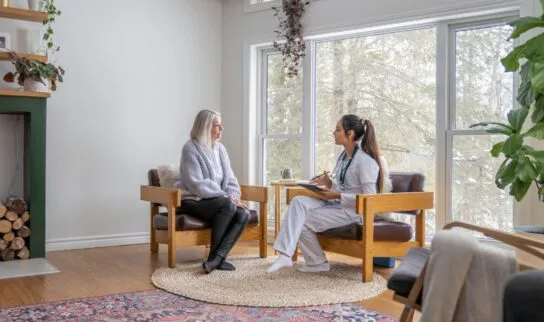Independent Living
Independent living is a type of senior housing designed for active, independent seniors who are able to live on their own but would like access to certain amenities and services.
What is Independent Living and What Does It Mean for Seniors?
Independent living communities typically provide seniors with a safe and secure living environment, access to social and recreational activities, and convenient access to essential services such as transportation and housekeeping.

Seniors who choose independent living can enjoy a low-maintenance lifestyle, with the freedom to come and go as they please, while still having the peace of mind that comes with knowing help is nearby if needed.
The Importance of Finding the Right Independent Living Community
Finding the right Independent Living Community is crucial to their overall health, well-being, and quality of life. The right community can provide seniors with access to essential services, social opportunities, and medical care as needed, while also allowing them to maintain a sense of independence and autonomy. Living in the right environment can also help seniors stay active and engaged, reduce feelings of isolation and loneliness, and prevent or delay the onset of chronic health conditions. In addition, a suitable Independent Living Community can offer peace of mind for family members and loved ones, knowing that their senior loved one is safe, secure, and well-cared for. Therefore, it is important to carefully consider the needs and preferences of seniors when choosing a living arrangement and to explore all available options to find the right fit for each individual.

Finding the best senior living is complicated. We've made it easier with our free Care Assessment Tool. Try it.
Independent living is a type of senior living community that is designed for older adults who can live independently. They do not need any assistance with their activities of daily living (ADL’s). It typically involves living in a private apartment or home within a community or complex that is specifically designed for seniors.
Independent living communities offer a wide range of amenities and services, including social activities, transportation, meal services, housekeeping, and maintenance. However, they do not provide medical care or personal assistance with activities of daily living (ADL’s) such as bathing, dressing, and medication management.
In contrast, other senior living communities such as assisted living, nursing homes, and memory care provide more comprehensive support and care for seniors.
Assisted living communities offer assistance with activities of daily living (ADL’s) and may provide medical care as well.
Nursing Homes provide 24-hour nursing care for seniors with chronic or acute medical conditions.
Memory care is specifically designed for seniors with dementia, Alzheimer’s disease, or other cognitive decline diseases
Independent living is often chosen by seniors who are in good health and want to maintain their independence while enjoying the benefits of a community setting. It is also a good choice for those who do not require regular medical care or personal assistance.
Maintenance-free lifestyle
One of the biggest benefits of independent living communities is the maintenance-free lifestyle they offer. Seniors can enjoy living in their own private apartments or home without the worry of maintaining a property or performing household chores. This can provide more time and energy to pursue hobbies, interests, or social activities.
Social activities and events
Independent living communities offer a range of social activities and events designed to help seniors stay active and engaged. These may include group outings, game nights, fitness classes, movie screenings, and educational seminars. Participating in these activities can help seniors build new friendships and maintain a sense of community.
Opportunity to live in a community with other seniors
Independent living communities provide seniors with the opportunity to live in a community of peers. This can be especially beneficial for seniors who may feel isolated or lonely living alone. In an independent living community, seniors can connect with others who share similar interests and experiences.
Access to on-site amenities and services
Independent living properties often provide access to on-site amenities and services such as transportation, meal services, and wellness programs. These amenities can help seniors maintain their independence while providing access to necessary support services.
Peace of mind
Independent living communities often have security features such as locked entrances, surveillance cameras, and emergency response systems to help ensure the safety of residents. This can provide peace of mind for seniors and their loved ones.
Independent living communities are generally designed for seniors who are in good health and are able to live independently. However, there are certain types of seniors who may benefit more from an independent living community than others, as well as those who may not be well-suited for this type of living arrangement. Here are some examples:
Seniors who may benefit from an independent living community:
- Active seniors: Seniors who are active, enjoy socializing, and want to participate in various activities and events may benefit from an independent living community’s social opportunities and amenities.
- Seniors who want a maintenance-free lifestyle: Seniors who do not want to worry about maintaining a home or dealing with household tasks, such as yard work or housekeeping, may appreciate an independent living community’s maintenance-free lifestyle.
- Seniors who want a sense of community: Seniors who want to live in a community with other seniors and have a sense of belonging may find an independent living community fulfilling.
- Seniors who want access to amenities: Seniors who want access to amenities such as fitness centers, dining options, and transportation services may benefit from an independent living community’s offerings.
Seniors who may not be well-suited for an independent living community:
- Seniors who are on a tight budget: Independent living communities can be expensive, so seniors who are on a tight budget may find this type of living arrangement financially challenging.
- Seniors with significant health needs: Seniors who require extensive medical care, such as those with chronic health conditions or mobility issues, may be better suited for an assisted living or skilled nursing facility.
- Seniors who prefer a more private living arrangement: Seniors who prefer to live alone and do not want to socialize with other seniors may not enjoy the communal living environment of an independent living community.
Choosing the right independent living community for a loved one can be overwhelming, but here are some tips to help you make an informed decision:
- Take a Care Assessment Test: Use our free care assessment tool to determine the exact level of senior living that best matches your needs.
- Determine your budget: Before starting your search, determine your budget and what you can afford. Independent living communities can vary in cost, so it’s important to have a clear understanding of your financial limitations.
- Consider the location: Choose a location that is convenient for your loved one and their needs. Consider factors such as proximity to family, friends, shopping, and medical facilities.
- Choose a Senior Living Advisor: These highly trained professionals know all of the senior living options in the region you are searching for. Their services are free. They will help you research, tour, and work out contracts.
- Visit the communities: Your senior living advisor will set up tours for t several independent living communities. Talk to the staff and residents to get a sense of the atmosphere and quality of care provided.
- Look for amenities and services: Be sure your senior living advisor provides you with all of the amenities and services offered at each community, such as meal services, housekeeping, transportation, and recreational activities. Ensure that they meet your loved one’s needs and preferences.
- Evaluate the community’s safety and security measures: Safety and security are important considerations. Ensure that the community has proper safety measures in place, such as secure entry, emergency response systems, and trained staff.
- Check the community’s reputation: Look for online reviews and feedback from residents and their families. This can give you an idea of the community’s reputation and the quality of care provided.
- Ask about socialization opportunities: Socialization is crucial for seniors’ mental health and well-being. Look for communities that offer opportunities for socialization, such as group outings and events.
- Consider future needs: Choose a community that can accommodate your loved one’s future needs, such as the availability of on-site healthcare or assisted living services.
When considering a senior living facility for yourself or a loved one, it’s important to take into account various factors to ensure that the facility meets your needs and preferences. Some of the most important factors to consider include:
- Location: The location of the facility is a crucial factor to consider. You may want to choose a facility that is close to your home or your loved one’s home to make it easy for family and friends to visit. Additionally, you may want to choose a location that is in a safe and pleasant area.
- Services and Amenities: Consider the services and amenities that the facility offers, such as meal services, housekeeping, laundry, transportation, and recreational activities. Look for facilities that offer a variety of services and amenities that meet your needs and preferences.
- Staff Qualifications and Experience: The qualifications and experience of the staff are critical factors to consider. Look for facilities that employ trained and experienced professionals who have the skills and knowledge to provide quality care. You may also want to consider the staff-to-resident ratio to ensure that there are enough staff members to provide adequate care.
- Resident Reviews: Check out reviews and feedback from current and past residents and their families. These reviews can provide insight into the quality of care and services offered at the facility. You can find reviews online or ask the facility to provide references.
- Costs: The cost of care is another crucial factor to consider. Look for facilities that offer services within your budget while providing high-quality care. Make sure you understand all the costs involved, including any additional fees or charges.
Finding and choosing an independent living community for yourself or a loved one can be overwhelming, but here are some steps to help you get started:
- Take a Senior Needs Assessment: Start with this free tool to help you determine the exact level of care you or your loved one needs.
- Choose a Senior Living Advisor: Find a senior living expert who lives and works in the region you are searching. They will prove your strongest asset to maneuver through this complicated process.
- Determine your needs: Before beginning your search, determine what you or your loved one needs in an independent living community. This may include location, amenities, services, and budget.
- Research communities: Once you connect to your senior living advisor, they will be your trusted resource to research independent living communities in your desired location.
- Schedule tours: Once your senior living advisor provides you with a list of potential communities, let him or her set up tours. This will give you a chance to see the facilities, meet the staff, and ask questions.
- Ask questions: Before you tour, work with your senior living advisor to prepare all the questions you want to ask. Then during your tour, ask the staff questions about the community’s services, amenities, and staff qualifications. Here are some questions you might want to ask:
- What services and amenities are included in the monthly fee?
- Are additional services available, and if so, what is the cost?
- Is transportation provided for residents?
- What are the staffing levels, and are they trained in senior care?
- What is the process for handling medical emergencies?
- What is the policy for visitors, and are there any restrictions?
- Are there opportunities for socialization and recreational activities?
- What is the process for transitioning to assisted living or nursing care if needed in the future?
- Consider the community’s culture: Observe the community’s culture during your tour to see if it aligns with your or your loved one’s values and preferences. Pay attention to the atmosphere, friendliness of staff and residents, and overall sense of community.
In summary, beginning the process of finding and choosing an independent living community requires determining your needs, connecting with a senior living advisor who will provide you with research on scheduling tours, asking questions, and sharing information on the community’s culture.
Independent living is a type of senior living community that is designed for older adults who can live independently. They do not need any assistance with their activities of daily living (ADL’s). It typically involves living in a private apartment or home within a community or complex that is specifically designed for seniors.
Independent living communities offer a wide range of amenities and services, including social activities, transportation, meal services, housekeeping, and maintenance. However, they do not provide medical care or personal assistance with activities of daily living (ADL’s) such as bathing, dressing, and medication management.
In contrast, other senior living communities such as assisted living, nursing homes, and memory care provide more comprehensive support and care for seniors.
Assisted living communities offer assistance with activities of daily living (ADL’s) and may provide medical care as well.
Nursing Homes provide 24-hour nursing care for seniors with chronic or acute medical conditions.
Memory care is specifically designed for seniors with dementia, Alzheimer’s disease, or other cognitive decline diseases
Independent living is often chosen by seniors who are in good health and want to maintain their independence while enjoying the benefits of a community setting. It is also a good choice for those who do not require regular medical care or personal assistance.
Choosing the right senior living community for a loved one can be a difficult decision, but there are several factors that can help determine whether an independent living community is the right choice. Here are some things to consider:
- Health and mobility: Independent living communities are generally designed for seniors who are in good health and are able to live independently. If your loved one requires assistance with daily activities or has mobility issues, they may be better suited for an assisted living or skilled nursing facility.
- Lifestyle preferences: Independent living communities offer a range of amenities and services, so it’s important to consider your loved one’s lifestyle preferences. Do they enjoy socializing and participating in group activities? Are they interested in fitness or cultural programs? Make sure the community you choose can accommodate their interests.
- Location: Consider the location of the independent living community and how it will affect your loved one’s access to medical care, family and friends, and other important services and amenities.
- Cost: Independent living communities can vary in cost, so it’s important to consider your loved one’s budget and whether they can afford the monthly fees associated with living in a community.
- Reputation and reviews: Research the reputation and reviews of the independent living communities you are considering. Look for communities with a good reputation for providing quality care and amenities, and read reviews from current and former residents and their families.
- Visit the community: Finally, it’s important to visit the independent living community in person. Take a tour, meet the staff, and talk to current residents to get a sense of the community’s atmosphere and whether it would be a good fit for your loved one.
Ultimately, choosing the right living arrangement for a loved one requires careful consideration of their health, lifestyle preferences, location, budget, and reputation of the independent living community. With careful research and a thorough assessment of your loved one’s needs, you can find the right independent living community that provides the care, services, and amenities your loved one deserves.
Provided in an Independent Living Community
Independent living communities offer a range of services and amenities that are designed to support the needs and preferences of older adults who want to maintain their independence.

Here are some of the typical services and amenities provided in an independent living community:
Independent living communities offer private apartments or homes that are designed for seniors. These living spaces typically include a kitchenette or full kitchen, a bathroom, and one or more bedrooms.
Independent living properties offer housekeeping and maintenance services to help seniors maintain a clean and safe living environment. This includes cleaning common areas, performing maintenance and repairs, and providing laundry services.
Many independent living facilities provide transportation services to help seniors get to appointments, social activities, and errands.
Independent living communities may offer meal services, such as communal dining or restaurant-style meals, to provide nutritious and delicious meals for seniors.
Independent living communities offer a range of social activities, such as fitness classes, game nights, movie screenings, and educational seminars, to help seniors stay active and engaged.
Independent living properties typically offer security features such as locked entrances, surveillance cameras, and emergency response systems to help ensure the safety of residents.
Independent living communities may offer health and wellness services such as exercise programs, health screenings, and wellness clinics to help seniors maintain their physical and mental health.
Many independent living communities are pet-friendly and allow residents to keep pets in their apartments or homes.

Need help urgently? Find the Best Local Independent Living Community Now.
